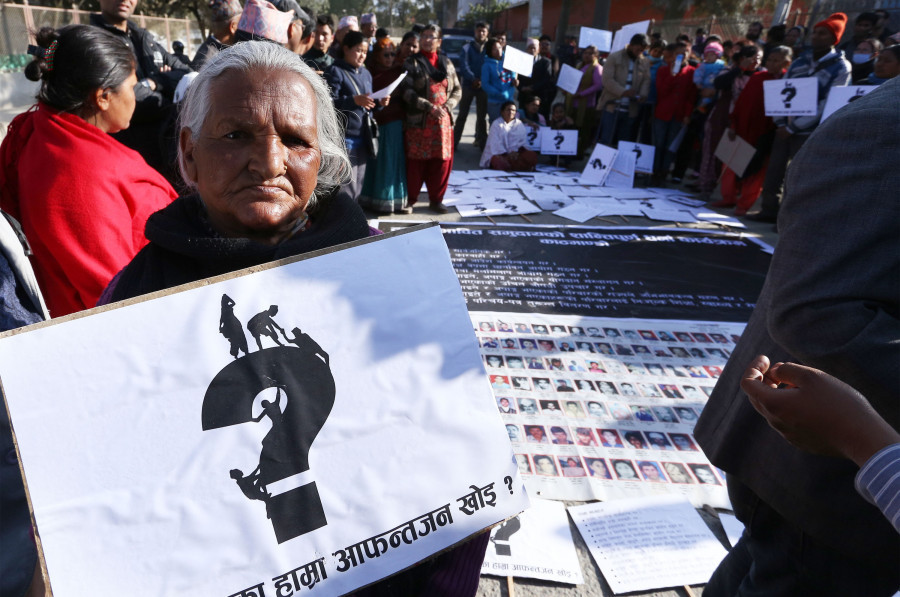Columns
Transitional justice, conflict victims and human dignity
Nepal has failed miserably as a responsible state that is willing to investigate war-era atrocities.
Madhav Joshi
Fourteen years ago, on November 21, 2006, the Maoist party and the Nepal government negotiated a Comprehensive Peace Agreement (CPA) to end a decade-long armed conflict that left over 15,000 dead and over 50,000 displaced. The agreement called for a commission on disappeared people and a commission on truth and reconciliation. After delays and court battles and almost nine years of work, these two commissions were finally established in February 2015. Five years since their establishment, however, conflict survivors and victims' families are still looking for justice and reconciliation. The Commission of Investigation on Enforced Disappeared Persons has yet to complete the investigation of 2,500 cases of conflict-era enforced disappeared persons, and the Truth and Reconciliation Commission has yet to begin the investigation of over 63,000 complaints of serious human rights violations.
Since the CPA in 2006, Nepal has promulgated a new constitution, adopted a federal system, and made significant political reforms to transition from a monarchy to a republican system. Through this process, Nepal has empowered marginalised communities and women by giving them access to more political power. Amidst all of these transformative political changes, however, Nepal has failed miserably as a responsible state that is willing to investigate war-era atrocities, hold the perpetrators accountable, and find pathways to reconciliation. Most conflict victims in Nepal cannot trust the state, as they see the government and political parties in power delaying the transitional justice process for political gains. The Nepali state has yet to recognise victims of the conflict for their dignity as human beings and as citizens, and neither the advocacy nor the campaign for transitional justice has been very successful.
Lack of urgency
Similar to Nepal, several countries are either going through transitional justice processes or are about to initiate them. In Colombia, four years since the implementation of the 2016 Final Agreement, the Truth and Reconciliation Commission process has successfully processed thousands of testimonials. In the Philippines' Bangsamoro, the Transitional Justice and Reconciliation Commission's 2016 report called for a Truth and Reconciliation Commission mechanism, which is expected to begin soon as part of the normalisation process. In South Sudan, the establishment of the Truth and Reconciliation Commission process has yet to be initiated as stipulated in the 2018 revitalised peace agreement.
Across different parts of the world, narratives coming out of these transitional justice processes tell similar stories of survivors and victims' families. They have been waiting for too long. While conflict victims may be resilient, many have been waiting for generations, and the effectiveness of transitional justice will depend on a swift response taking victims into account. It helps to get to the truth quickly. Waiting for too long permits the passing of trauma from one generation to another. Even after waiting for many years, survivors and victims' families, in many instances, are asked to move on so that the state does not have to make hard choices in order to find the truth and bring the perpetrators to justice. This is a denial of the lived experience of war atrocities, denial of the identity and dignity of victims, and, most importantly, a lost opportunity for the state, community, victims and perpetrators to initiate a healing process.
The transitional justice-related issues in societies emerging from armed conflicts are framed as facing stark choices between restorative and retributive justice options. The given alternatives are not so clear for survivors and victims' families. Many of them show the utmost willingness to reconcile with the past for truth. They are waiting for the perpetrators to come forward, take responsibility, and perhaps help in locating mass graves so that those who have been killed can be properly identified and cremated or buried.
Holding the perpetrators accountable is the decision a responsible state must make. In any transitional justice process, only a handful of the perpetrators are prosecuted for their actions, and even these actions are contingent on the willingness of political leaders who might not sense any urgency to initiate the transitional justice process.
A collective responsibility
Once peace accords are signed, the need for transitional justice is often sidelined to achieve key peace process milestones such as demobilisation and post-conflict elections. Once armed groups are demobilised and elections are held, the political actors return to their usual contentious politics. Silencing the guns becomes a major accomplishment for the international community; the conflict is behind, the peace is consolidated, and the country moves forward. This trajectory, however, leaves conflict victims behind. Survivors of war atrocities and victims' families can never be part of this trajectory. For them, time stops the moment they start waiting for truth and justice; and when the state, political leaders and others who would be able to make a difference choose not to do their part. It is unfortunate that conflict victims, in many instances, are left alone as if their status was their own fault, and they are left without closure for their trauma and grief. The transitional justice process should not be a fight led by individual survivors or victims' families against a state who may be protecting perpetrators. Ideally, it is a countrywide effort to advance truth and justice that the state must facilitate as a collective process involving communities, political and religious leaders, and citizens.
Recognising the dignity and worthiness of lost loved ones as citizens that the state failed to protect is paramount to the transitional justice process. The process helps the state regain trust from its citizens, as seen in South Africa and Liberia. Both countries managed to deliver relatively successful reparations and non-repetition guarantees through institutional reforms as part of their transitional justice process. This success was possible through advocacy and campaigns focused on legal and indigenous pathways to justice and reconciliation so that the dignity of conflict victims could be restored.
In the coming days, Nepal and other countries implementing transitional justice processes need to find ways to collaborate with victims and relevant stakeholders. With collaboration comes the opportunity to identify innovative and effective approaches to address transitional justice-related issues, including the restoration of dignity for conflict victims and survivors. This helps ensure that transitional justice remains part of a successful peace process narrative.
***
What do you think?
Dear reader, we’d like to hear from you. We regularly publish letters to the editor on contemporary issues or direct responses to something the Post has recently published. Please send your letters to [email protected] with "Letter to the Editor" in the subject line. Please include your name, location, and a contact address so one of our editors can reach out to you.




 18.12°C Kathmandu
18.12°C Kathmandu















